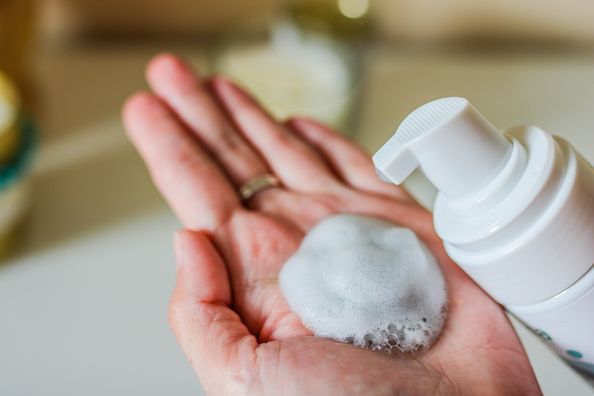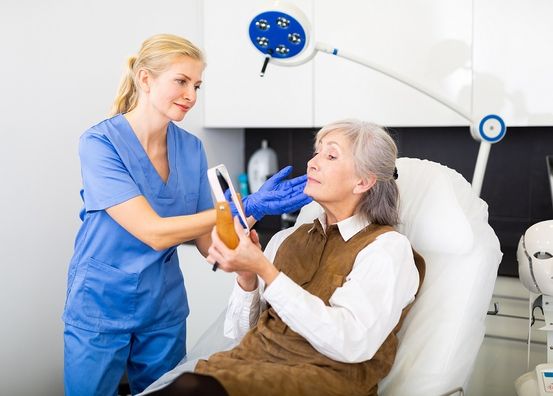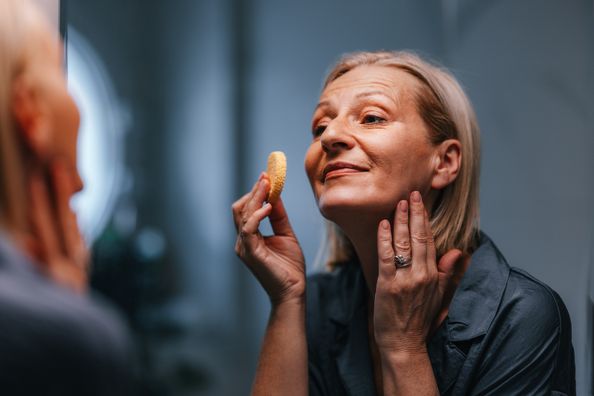Question: What do peanuts, shellfish, and wheat all have in common?
Answer: They are some of the most common food allergies.
While this might seem like an easy question — and you could probably list off a dozen other common food allergens — you may be less familiar with the allergens that can cause your skin to have a reaction, also called contact dermatitis.
What Is Contact Dermatitis?
Contact dermatitis is when your skin develops a rash after becoming sensitive to a certain allergen that is making direct contact with your skin.
Some common allergens that cause a skin reaction include soaps, perfumes, cosmetics, and other personal hygiene products.
In the US, contact dermatitis occurs in up to 20% of people, making it more common than food allergies (which only affect around 10% of people).
Allergies can develop at any point in your life, which can leave you feeling surprised when your skin is more sensitive than usual. In addition to developing allergies, some ingredients in soaps can simply cause a skin reaction like dryness or itchiness.
Noticing new skin reactions? Your Duly dermatology provider can help you figure out what’s changed.
Find a Dermatology Provider near you >
Everyone wants to feel comfortable in their own skin — and paying attention to different allergens and sensitivities can help you do just that.
Here are 4 common ingredients that can irritate your skin.
1. Sulfates and Parabens
There are many ingredients that go into your soap or shampoo that allow it to do its job of keeping you clean. Two of these ingredients are sulfates and parabens.
Sulfates are often found in shampoos and create the lathering effect that helps clean your hair. Parabens are often used in cosmetics to prevent bacteria and mold from growing.
Many shampoos and hair care products now list themselves as “Sulfate- and Paraben-Free,” as these ingredients can dry out your skin. Switching to a body wash or shampoo that is made without sulfates and parabens can be a good place to start if you have sensitive skin.
2. Fragrance
You might be wondering, “Fragrance? What’s fragrance?” If so, you’re not alone in this confusion.
When it comes to making soaps and other cosmetic products, companies can get a little hush-hush about how their products are made and what ingredients they’re made with. Just like your grandma’s perfect homemade meal has a secret ingredient, companies also treat what’s in their products with the same secrecy.
Except — instead of a dash of rosemary added to the potatoes — with cosmetic companies, their “secret ingredient” could actually be a whole list of ingredients.
This combination often falls under the category of “fragrance” and could include multiple allergens. While this mystery is good for business (you don’t want anyone copying your product), it is difficult for consumers who are just trying to figure out why their skin is irritated.
3. Metals
While less common in soap, there may be metal in other cosmetic products or household cleaning products you’re using. Because of how common metals are in our everyday lives, you may not realize how often you’re coming into contact with them or how they may be affecting you if you have sensitive skin.
Some common metal allergies include nickel and aluminum — the American Academy of Dermatology even named aluminum the 2022 “Allergen of the Year.” Aluminum is still an ingredient in some deodorants and might be irritating your skin as you perspire throughout the day.
4. Other Ingredients
This might seem like a catch-all category, but unfortunately, it’s true. Different soaps, body washes, and shampoos have different ingredients. There are many parts that go into each product — and some might not be listed on the back of the bottle.
There might be something specific that’s causing skin irritation, like an essential oil. This can make it difficult to pin down exactly what is causing a reaction or irritation, but your Duly dermatologist can help you narrow the list.
What Can I Do About a Soap Sensitivity?
If your skin is reacting to something — and you can’t figure out what — you may get frustrated. But while it can be annoying to figure out a skin sensitivity, that doesn’t mean it’s impossible or that you’re out of options.
Start by changing up the products you’re using, and notice if you see a change in how your skin is reacting — or not reacting. There are many natural soap options available that are made with fewer, more clearly labeled ingredients. This can make it easier to know if something is bothering your skin, or may help clear up your reaction.
Sometimes a simple change in products might help you handle your skin irritation or allergic reaction — but you may need more guidance.
Your Duly care provider or dermatologist can help you identify different allergies using a patch test to see what’s causing a reaction. They can also recommend the best products to address your unique skin concerns.
Learn more about our Dermatology services, or schedule an appointment with a dermatologist today.
Find a Dermatology Provider near you >
Health Topics:








